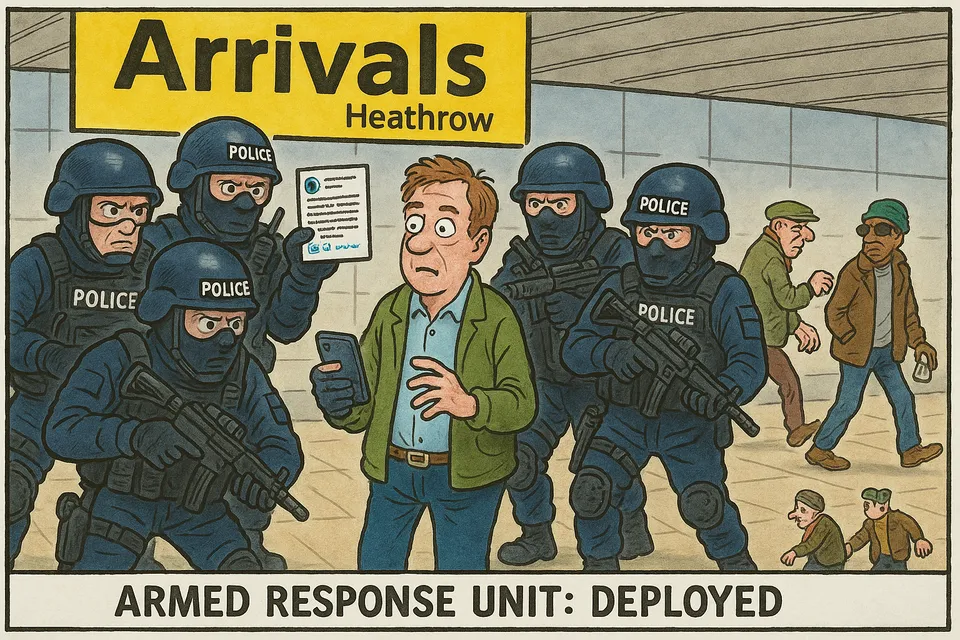Britain's Broken Discourse: When Comedy Writers Become Security Risks

Freedom of Speech Under Siege in the UK
Graham Linehan's arrest highlights a troubling trend in the UK's approach to free speech and public discourse. As the state increasingly views dissenting opinions as threats, the implications for comedy, satire, and open dialogue become dire.
Commentary Based On
The Independent
Graham Linehan claims he was arrested at Heathrow Airport for posts about trans people
Graham Linehan, creator of beloved comedies Father Ted and The IT Crowd, was detained by five armed officers at Heathrow Airport for three social media posts targeting transgender people. One post encouraged followers to “call the cops” and “punch him in the balls” regarding trans individuals. Another described a Pride photo as one “you can smell.” The stress of his arrest sent his blood pressure into “stroke territory.”
This wasn’t random enforcement. Linehan faces separate trial charges for harassing transgender activist Sophia Brooks and damaging her phone. His bail condition prohibits him from using X, the platform where his 840,000 followers received his posts.
The Metropolitan Police deployed aviation unit officers—routinely armed at airports—to arrest a comedy writer for tweets. Not drug smuggling. Not terrorism. Tweets.
The Institutional Response Reveals Systemic Dysfunction
Policing Priorities: British police struggle to investigate burglaries and respond to emergencies, yet found resources to coordinate an airport arrest for social media posts. The Met’s aviation unit, designed for serious security threats, detained a middle-aged writer whose most dangerous weapon was sarcasm.
Court System Backlog: Linehan waits until October for his next interview while facing Thursday trial dates for separate charges. Britain’s courts creak under delays, but apparently find capacity for multiple proceedings against one controversial comedian.
Enforcement Inconsistency: Twitter/X hosts millions of inflammatory posts daily. Why Linehan? Why these specific tweets among thousands of similar content? The selective enforcement suggests either arbitrary application or targeted policing—neither inspires confidence in institutional competence.
The Pattern Recognition Problem
This incident crystallizes Britain’s broader institutional decay across multiple dimensions:
Authority Without Legitimacy: Police arrest citizens for tweets while knife crime soars and response times deteriorate. Citizens notice this contradiction. Trust erodes accordingly.
Process Over Outcomes: The system generates arrests, court dates, and bail conditions without demonstrably improving public safety or social cohesion. Bureaucratic activity masks policy failure.
Cultural Battleground Displacement: Rather than address housing costs, economic stagnation, or public service collapse, institutions expend energy policing online discourse. Real problems persist while symbolic victories accumulate.
The Democracy Deficit
British democracy depends on robust debate, including uncomfortable perspectives. Yet the state now arrests citizens for expressing views shared by significant portions of the population—however crudely expressed.
The transgender rights debate divides public opinion, but arresting prominent figures doesn’t resolve underlying tensions. It drives conversations underground while demonstrating state power over dissenting voices.
Meanwhile, actual democratic processes—local council effectiveness, parliamentary accountability, bureaucratic transparency—continue deteriorating without similar enforcement attention.
What the Evidence Actually Shows
Police Resource Allocation: Armed officers available for tweet enforcement while 999 response times reach record highs.
Court System Strain: Multiple proceedings for one individual while serious crimes await trial dates.
Social Media Strategy: Reactive arrests generate headlines but don’t reduce online hostility or improve community relations.
Public Trust Metrics: Faith in police fairness and judicial competence continues declining while high-profile cases like this reinforce perceptions of two-tier justice.
The Competence Question
Effective governance would address root causes rather than symptoms. If Linehan’s posts genuinely incited violence, the response should prevent harm while preserving democratic norms. Instead, Britain produces:
- Selective enforcement that appears politically motivated
- Resource allocation that ignores urgent public safety needs
- Legal processes that multiply rather than resolve social conflicts
- Institutional responses that worsen rather than improve social cohesion
Reality Check: Decline Indicators
This single arrest encapsulates multiple failure modes:
- State Overreach: Using serious security resources for non-serious threats
- Priority Inversion: Policing speech while ignoring crime
- Process Proliferation: Creating multiple legal proceedings without clear outcomes
- Authority Erosion: Demonstrating state power while undermining state legitimacy
British institutions once commanded respect through competent performance. Now they demand deference through coercive enforcement. The difference explains why public trust continues collapsing.
Whether you support or oppose Linehan’s views, the institutional response reveals a system more focused on controlling discourse than solving problems. That’s not governance—it’s decline management.
The comedy writer may have lost his career to controversial opinions. But British democracy is losing something more valuable: the institutional competence that once made robust debate possible without armed police intervention.
The Decliner tracks institutional performance, not political preferences. The facts remain uncomfortable regardless of your position on transgender rights or free speech.
Commentary based on Graham Linehan claims he was arrested at Heathrow Airport for posts about trans people by Bryony Gooch on The Independent.